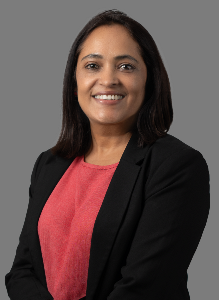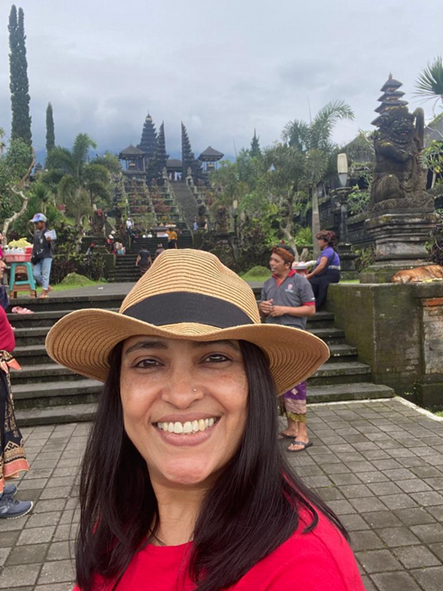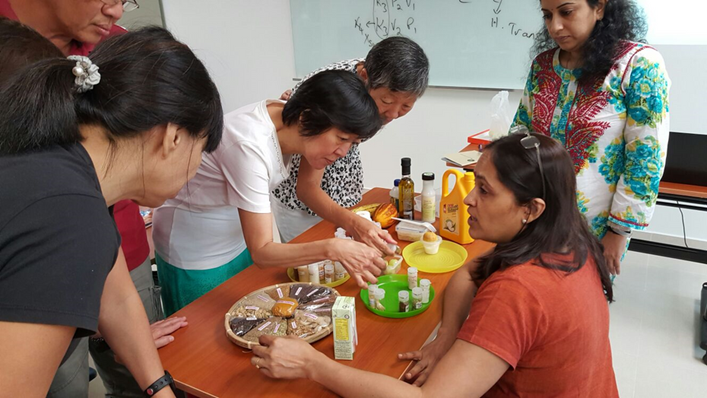With a rich background in biochemistry and hospital administration, Shailu shares more about her passion for improving healthcare outcomes, giving health tips based on her knowledge of Indian Traditional Medicine and how exploring off the beaten track led to discover her second home.
Read the scoop below to find out more:
1. Hi Shailu! Please tell us about your professional background.

I began my career at NUS way back in 1997 when I had just moved to Singapore. Having completed my Masters in Biochemistry from India and my favourite module being Human Physiology, it was my love for healthcare that got me my first job at NUH in the Department of Anaesthesia. I started with wet-bench lab work and animal studies, studying pain pathways with a Japanese professor and the Anaesthetists, trying to find an alternative to morphine. It was a steep learning curve and a great opportunity to understand everything that happens within a hospital including watch live heart surgeries, sit in medical students’ lectures, be the first Singaporean to be trained and manage Singapore’s first Anaethesia Simulator. This passion for working in a hospital made me take up another Masters in Biomedical Engineering in NTU. After completing my Masters, I moved on to gain experience as an administrator at A*STAR, supporting Philip Yeo (then Chairman of EDB) and BMRC in its Singapore’s Biomedical Sciences Phase 1 vision.
Along the way, I also taught at NYP in the School of Life Sciences and MDIS, to remain close to my science background, with teaching being my other passion. Realising that my main passion was still administration and working in hospitals, I got back to the hospitals and last stint was with Parkway group of hospitals at Mount Elizabeth Hospital (Orchard) (Mt. E). Making a difference to patient experience through innovative processes and solutions gave me utmost joy and satisfaction. Mt. E also gave me the opportunity to learn different regional cultures as I served VVIPs from India, Bangladesh, Sri Lanka and Indonesia. Parkway posted me in India to head their hospitals in Bangalore as the CEO. I was the first Singaporean to be sent on an overseas mission to head their newly acquired hospitals in India. This indeed was a great experience and what could never have experienced in Singapore was achieved over there. We rolled out new clinical programmes including Heart and Lung transplants and learnt how to “do more with less”! From managing mass casualty drills, to speaking at press conferences, handling Indian VVIP protocols, managing hospital Profit & Loss, cutting down operational costs and clamping corrupt practices, felt like a massive crash course in Hospital Administration and Management.
During Covid-19 lockdown, I was with Health Promotion Board (HPB), heading the ground operations division for the Testing Operations & Strategy Task Group. My professional journey has been nothing short of exciting events, with many ‘Firsts’ on the list.
2. Share more about the modules/courses which you teach at NUS-ISS.
I currently teach Introduction to Healthcare Informatics and Data Storytelling. I will also be involved in teaching Data Driven Decision Making shortly.
3. Why did you choose to teach at NUS-ISS?
I am a firm believer in applying knowledge gained (be it through studies or on the job) in a practical manner to make a difference in a person’s life, especially for health benefits. When I saw the opportunity to help the healthcare industry achieve better outcomes through tools and courses adopted from other industries; being able to strategically lead, plan and roll out the support and training required by the healthcare sector, it was clear that this job was bringing together my passions in supporting the healthcare sector, teaching as well as administration.
4. What do you enjoy most about your work?
Strategic Planning and Learning & Development. Working in hospitals or other statutory bodies, leaves us with very little room to upgrade our skills and knowledge. At NUS-ISS, we constantly learn and acquire knowledge to enable productive partnerships with the healthcare work force or industry partners, with the objective of making a difference in people’s lives.
5. How do you keep up with the industry?
Having partnerships with hospitals and industries, including industry attachments, will help us keep up with the healthcare industry needs as well as latest developments.
6. What are your favourite activities when you are not working?
Gardening, watching hospital or clinical related TV shows and improving my knowledge in Indian traditional medicine (Ayurveda). I also love travelling, especially to Bali, and it's practically my second home!

At Pura Besakih (Mother Temple of Bali) in Bali, Indonesia
7.Tell us something about yourself that very few people know.
Having been born into a well-established Indian Traditional Medicine House, I have had a natural inclination towards advising people on how to lead a healthy life through cultivating the right eating habits and lifestyle. As an entrepreneur, I have established Indian Traditional Medicine Clinics in Singapore in 2010, primarily treating patients with chronic disorders and preventive care. In 2011, I was nominated as one of the 5 finalists for “Promising Indian Entrepreneur” by Singapore Indian Chamber of Commerce & Industry.
As a way of contributing to society, I conduct free talks and workshops at local community centres, the Esplanade and other various places on healthy diet & lifestyle using the principles of Indian Traditional Medicine.

Conducting free workshops at community centres